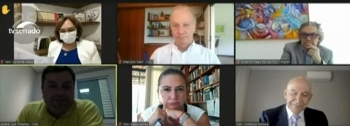“While GDP is recovering well, Brazilians’ average employment income has fallen 11% in real terms. Among the poorest people, it has dropped 21%,” said FGV Social’s director, Marcelo Neri.
On June 11, 2021, FGV Social participated in a meeting of the Senate’s Temporary COVID-19 Committee. This committee brings together specialists to discuss people’s needs, during and after the pandemic, from health, economic and social perspectives.
The meeting’s guests were Marcelo Neri, the director of FGV Social; Arionaldo Rosendo, the Health Ministry’s planning and budget undersecretary; and Ricardo Paes de Barros, a professor of economics at Insper, a higher education institute in Sao Paulo.
One of the points analyzed by Marcelo Neri was Brazilians’ perceptions. FGV Social recently carried out a study on this topic, comparing Brazilians with people in 40 other countries. People’s satisfaction with education, the health system and the environment, among other things, has worsened during the pandemic more in Brazil than in other countries. On the other hand, Brazilians’ perception of violent crime has improved relative to the rest of the world.
Neri also shared data from another recent FGV Social study called “Employment Well-Being, Happiness and the Pandemic.” Feelings of anger, concern, stress and sadness have worsened more in Brazil during the pandemic than in 40 other countries, on average. This study also indicated that Brazilians’ average level of happiness and inequality of happiness have both worsened.
Income inequality has also increased and average employment income has fallen during the pandemic. Brazilians’ average monthly income is R$30 lower than at the start of the last decade. When it comes to social well-being, the situation is much worse. At the beginning of the pandemic, this variable was very similar to its level a decade before, and it has since dropped 19.4%.
FGV Social’s director also said that 11% of Brazilians were living in poverty – defined as having an income of up to R$250 per month per person – before the pandemic. Because of the government’s emergency welfare program, the poverty rate then halved. After the program was wound down, the poverty rate tripled over the course of six months, to 16%.
In-depth data from another FGV Social study, called “Time for School,” was also presented at the committee meeting. Analysis broken down by income groups shows that the poorer the individual, the less the amount of school exercises received and, to make matters worse, the less time devoted to class exercises. Inequality of educational opportunities and outcomes has increased during the pandemic, reversing a decades-long trend of declining inequality.
Regarding increased truancy, Neri argued that the challenges presented could be overcome by accelerating vaccination and the resumption of in-person classes: “We are sacrificing education. Education in Brazil was already bad but it had been improving, in terms of both educational level and inequality, and this has reversed in the pandemic. So, the wind was blowing in favor of us but it is now blowing against us,” he said.
To find out more about FGV Social’s research, click on the links below.





